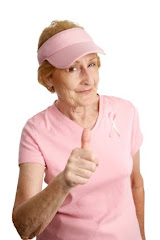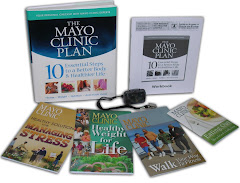by Frank Rosci
People these days are living longer than ever. And as they go through their longer, fuller, richer lives, they're taking better care of themselves and aging gracefully, so much so that even at 50 years of age and older - once upon a time considered "over the hill" - many are more like 30-year-olds in their thinking, behavior, viewpoint, attitude and even physique.
These baby-boomers are practically as active as their younger counterparts - they can still do many of the physically demanding things that younger people do, and they remain committed to staying that way for as long as humanly possible.
Why and how is this national phenomenon happening?
"One of the most important reasons are lifestyle changes, including far fewer people smoking than before, and a greater emphasis on diet and exercise," explained Hal Hockfield, M.D., an internist at Abington Memorial Hospital and a member of Abington Plaza Medical Associates.
"One of the most important reasons are lifestyle changes, including far fewer people smoking than before, and a greater emphasis on diet and exercise," explained Hal Hockfield, M.D., an internist at Abington Memorial Hospital and a member of Abington Plaza Medical Associates.
"Everything has changed today. People are working longer, and thinking and dressing younger, staying involved in the things they love to do, and are more active overall," he said.
"They're not retiring early as they did, for example, 20 years ago. People today don't want to do that because they don't want to turn into couch potatoes. There are people who are 75 and 80 who are still working, keeping their bodies and minds active."
In his view, people age 55 today are the 40-year-olds of two decades ago, while those 75 now are the 55-year-olds of 20 years ago.
"Nothing makes me happier than having an 85-year-old come to the office on the way to work," said Hockfield, half of whose large patient population is made up of geriatrics.
"If someone makes it to 70, chances are good that person will live to at least 85," he added.
They've Got More Info
Contributing to the 50-plus fountain of youth is the socio-economic fact that people are much better educated today about key health issues, Hockfield continued, with more readily available literature and research to support healthy living, which means society is seeing the results in terms of not just quantity (living longer) but also quality (living better and smarter).
"It's a very real thing, even if the cause is peer pressure in some instances, and it's a contagious movement among those 50 and older, with the expectation that if people are living longer, they can maintain this lifestyle for as long as they want to in order to enjoy a higher quality of life," he stated.
Hockfield also noted that the quantity and type of exercises may change as people get older - such as walking in the pool and mild water aerobics, what he considers "an excellent exercise that's easy on the joints."
A number of 50-year-olds also have home gyms, and some even have personal trainers, he observed, as part of a general trend toward healthier living.
Personal trainer and sports nutritionist Joanne Sgro, 33, of Bala Cynwyd, has about 10 clients age 50 and older under her wing at present, she reported.
"Exercise and healthy living is part of their lives and always has been," said Sgro. "They are well-educated and well-off socio-economically, so they have the time and interest to take care of themselves."
Among them is a 49-year-old woman into horseback riding, who sought Sgro to work on increasing her strength, a key to a finely tuned metabolism.
"She and others think exercise is fun, and they want to stay in shape for as long as they can," the trainer explained.
Other clients are into tennis and dance, activities for which Sgro customizes exercise regimens. Some are into weight loss as well, Sgro confided, inspired by her own story of winning a long battle against obesity by losing 200 pounds. She's worked as a personal trainer since 2001.
"Those in shape at 50 today have many more opportunities to stay in shape, with the numerous health clubs now in existence, for example, and they are much more likely to stay in shape later in life," attested Sgro.
From a psychological perspective, psychiatrist Mitchell Cohen, clinical associate professor of psychiatry and human behavior at Jefferson Medical College of Thomas Jefferson University, noted that for 50-year-olds today, there isn't the same pressure there used to be 20 to 25 years ago.
According to Cohen, "Back then, many at that age would simply accept that they were getting older and say to themselves that it was their last shot at being able to perform - to have one last fling. Now, because the wall of illness many would hit at 50 has been removed, they're in great health and able to do what they want.
"Today, people are younger than they used to be at that age. And many of the tasks that were part of middle life - of middle adulthood - are gone, such as the burden of making major decisions about how to handle the future of aging parents, who themselves are living longer, allowing their children to adjust more gradually to the challenge of coming to real terms with parents," said Cohen.
Now, those at 50 can relax a bit more about this and other questions that were pertinent in the past, and avoid the need to act out, to go through a so-called mid-life crisis, he said.
"This spreading out of time and reduction in stress, plus the fact that there has been a tremendous education of people who are 50 and older, is allowing them to live more freely, to feel they have some control over their lives - to feel more comfortable about things and to enjoy their good health in as many active ways as there are," concluded Cohen.
Free to Be
Over at Temple University, Dick Goldberg, an expert on the boomer generation, works with the "Coming of Age" project - a partnership among Temple, AARP, WHYY radio and the United Way. Run by Dr. Nancy Henkin through the university's Center for Intergenerational Learning, it's designed to inspire opportunities for people 50 and older in civic engagement and education in Greater Philadelphia.
"There are 1.5 million people 50 and older in the Greater Philadelphia area, many of whom are in better health than previous generations. Research suggests they're that way not only because they're committed, but because they've maintained their health all along," explained Goldberg.
Another reason for the vitality of today's 50-plus set, he remarked, has to do with fewer familial duties on their daily schedules: "Their child-raising obligations have lessened. In general, their children are grown, and have moved on."
The project's 2005-06 "Boomervision!" series - called "What Boomers Want" - has presented lectures on topics such as "Brain Health" by Paul Nussbaum, Ph.D., a neuropsychologist from the University of Pittsburgh's School of Medicine; and by local radio personality and author Dan Gottlieb, Ph.D., who has talked about "Meaningful Relationships" and the manifold benefits of "Good Work." Brooklyn-based freelance writer Ellen Freudenheim has also spoken.
"Coming of Age" was created two year ago, said Goldberg, and is intended to be in place in perpetuity - just as a lot of baby-boomers hope to be.
If this is an area of training that sounds interesting, you should consider continuing your education with advanced training to safely and effectively work with the mature adult who is experiencing the effects of aging. An excellent home-study CEC course that is recognized by all major certification organizations in the US and Canada is:
SrFit: Senior Fitness Specialty Certification
This in depth program (worth 19-24 CECs) will teach already certified and experienced personal trainers, lifestyle coaches, and athletic trainers to safely and effectively train adults age 45-62+ (Baby Boomers and Beyond). SrFit Home-study program
Personal Training Certification Organizations
American Academy of Health and Fitness: Fitness Specialty Certifications and Continuing Education Home Study Courses for Health and Fitness Professionals







No comments:
Post a Comment